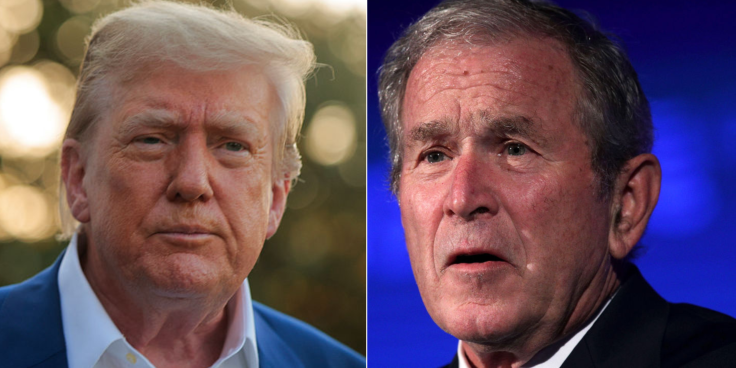
Donald Trump, who rose to power in part by criticizing the foreign interventions and national security overreach of previous administrations, is now adopting, and in some cases intensifying, tactics reminiscent of George W. Bush's post-9/11 "war on terror," according to a new sprawling report by Axios.
The Trump administration has authorized mass surveillance, preemptive military strikes, and the use of both domestic and foreign high-security prisons for detainees, many of whom are undocumented immigrants. In some cases, these individuals are denied due process.
Bush once used similar tactics, including detaining alleged terrorists in secret prisons and at Guantanamo Bay, as Axios explains. The Trump administration has also turned to "Gitmo" to detain individuals it claims have criminal histories.
A key parallel is the use of preemptive force. Trump ordered the launch of 14 bunker-buster bombs on Iranian nuclear facilities and missiles on an Iranian-backed proxy group in Yemen, citing concerns over nuclear threats. Bush made a comparable case in the lead-up to the Iraq war, though he sought Congressional approval—something Trump has not done in these instances.
Both administrations have relied on private sector partnerships for domestic surveillance. Bush enlisted telecom giants like AT&T; Trump has worked with tech firm Palantir. While Palantir told Axios it operates within the law and doesn't proactively collect data, Trump's proposed "One Big Beautiful Bill" would fund expanded surveillance operations.
Legal justifications also echo Bush-era approaches. Trump's team has cited Bush-era executive orders to defend recent immigration actions, and both administrations have invoked the "state secrets privilege" to withhold information from courts. Trump has even floated suspending habeas corpus, a move Bush attempted in 2006 before being overruled by the Supreme Court.
"Trump is saying out loud what the Bush administration did behind closed doors," said Vince Warren, executive director of the Center for Constitutional Rights to Axios.
Axios is hardly alone in its comparisons of both administrations. A Le Monde analysis published in late April suggested a clear correlation between Bush's use of the "war on terror" to bypass legal norms and Trump's current attempt to frame immigration as a national security threat to justify sweeping executive powers and sidestep judicial oversight.
"Twenty-five years later, Donald Trump is attempting a similar sleight of hand," explains Le Monde. "Trump doesn't hide that having to go through a lengthy judicial process for each criminal foreigner hinders his goal of massive deportations. By militarizing the fight against illegal immigration, he hopes to secure the exceptional powers granted to the commander-in-chief in wartime."
The International Crisis Group, an independent organisation that claims to work "to prevent wars and shape policies" also provided a similar analysis back on April 15, focusing on the the Trump administration's growing efforts against terrorist organizations:
"The deportation of alleged Tren de Aragua members to CECOT in El Salvador echoes the Bush administration's practice of extraordinary rendition in which suspected terrorists were sent to sites overseas for abuse at facilities run by the CIA or foreign partners. As with Bush's war on terror, Trump's renditions of supposed terrorists involve erroneous transfers of men into abusive conditions abroad based on sloppy misclassifications"
Although a spokesperon for Bush declined to comment on the Axios report, the news site did publish a statement from Trump spokesperson Harrison Fields:
"President Trump swore an oath to protect and defend the homeland and promised the American people he would end generational wars, and that's exactly what he's doing. No president has secured our nation and the world more successfully than President Trump, and the American people are safer today because of his leadership than ever before"
© 2025 Latin Times. All rights reserved. Do not reproduce without permission.





